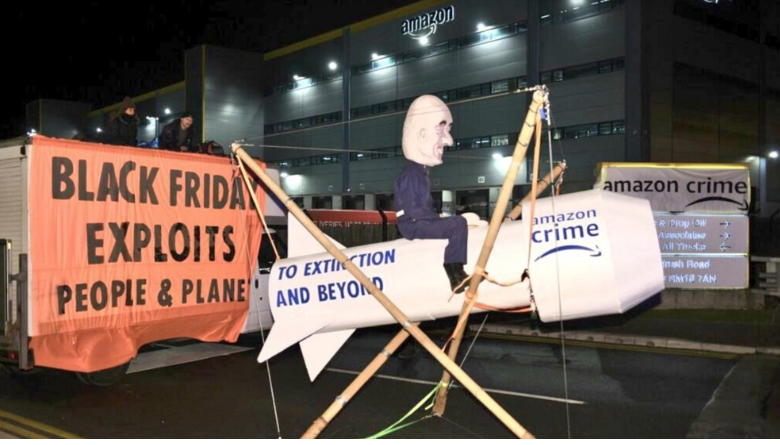CommentsCLIMATE PLEDGE - One benefit that Amazon has provided society with is a reduction in shopping-related violence.
The once legendary fights over low-priced electrical items have moved online, and the fight is now between who has the fastest fingers and the fastest internet connection. Black Friday, however, continues to supercharge an already hyper-consumerist society and push us closer to climate breakdown. Extinction Rebellion (XR) decided to call out the major online retailer on its most profitable day by blocking fifteen fulfillment centers in the UK, Germany, and the Netherlands. The fulfillment centers blockaded account for 50% of Amazon deliveries in the UK. In all, more than thirty arrests were made as the environmental group brought attention to Amazon’s wasteful business practices, tax avoidance and worker exploitation.
Extinction Rebellion (XR) decided to call out the major online retailer on its most profitable day by blocking fifteen fulfillment centers in the UK, Germany, and the Netherlands.
While XR’s detractors claim businesses are being affected in tough economic times, one man who has certainly not been affected by the Covid-19 pandemic is the founder of Amazon, Jeff Bezos. As people around the world hunkered down in their homes due to the deadly virus sweeping the planet, Amazon shares soared 8% as people switched to online shopping as bricks and mortar shops remained shuttered. In a single day in July 2020, the world’s richest man added $13 billion to his already burgeoning fortune. His net worth rose from $113 billion in March 2020 to over $200 billion today.
Now, many will counter that Mr. Bezos deserves his wealth because he had the foresight to start Amazon back in the early days of the internet and he is a hardworking benign genius. It’s easy to understand this thinking, especially for dedicated followers of Ayn Rand, but on closer inspection, Mr. Bezos and his online empire have benefited from a broken system that he and his billionaire chums would like to stay broken. Amazon has put the nail in the coffin for many high street retailers, and modern-day high streets may be unrecognizable when the pandemic finally ends. Shops that once provided society with tax revenues to pay for education and health care have been replaced by a global behemoth that in 2018 had revenues of $233 billion and a market value approaching $1 trillion and yet paid no federal income taxes and actually got a tax refund of $129 million.
Wherever and whenever Amazon can avoid taxes, it does. In Europe, it transfers 90% of its operating profits to Luxembourg where it pays 7.25% instead of 29%. It’s easy to see how Amazon is able to provide its products so cheaply and undercut its brick-and-mortar competitors when it doesn’t need to play by the same rules as brick-and-mortar shops.
In addition to legal tax avoidance, Amazon is also infamous for its inhumane working conditions where workers routinely complain of being treated like robots and being denied even basic bathroom breaks. Workers complain of being fired for taking sick days during the pandemic and drivers tell of urinating and defecating in bottles and bags as they cannot afford to stop to use a bathroom.
To counter his increasingly negative reputation, Bezos announced a $10 billion pledge to help fight the climate and biodiversity crises. Again, kudos to Mr. Bezos, but let’s remember that he paid four times as much money to make his ex-wife happy, and that he made more in a single day in 2020 than he is providing humanity in its fight for survival. In 2020, Bezos named the first recipients of his Earth Fund with $791 million going to sixteen organizations focussed on conservation. In the same year, he invested $1 billion in his vanity space project, no doubt hoping that he will have a Plan B should our ecosystems and societies collapse. That’s not the worst of it because Amazon is one of the biggest polluters in the U.S. His operation not only encourages wanton consumerism, which is the driving force behind the planetary collapse we are witnessing, but also produces more than 44 million metric tons (MMT) of fossil fuel waste. To put this into perspective, Amazon’s carbon footprint is more than those of the nation-states of Switzerland (38.95 MMT), Ireland (36.92MMT), Norway (39.8MMT) and Denmark (37.45MMT). In early 2019, 8,000 Amazon employees wrote a letter to Bezos asking him how the company was planning to address pollution and in September, 3,000 tech workers in Seattle walked out in protest at the company’s inaction on the climate crisis. Additionally, the group Amazon Employees for Climate Justice claim more than 1,800 employees in over 25 cities and 14 countries walked off the job in protest.
As more and more people move online to do their shopping, companies like Amazon will be able to slash their prices even further due to tax avoidance and unethical working conditions, and rampant consumerism will be encouraged even more. Maybe it’s time we join the members of XR and Amazon workers themselves in calling out the company, and maybe we could even go one step further, or a few more than that, and actually walk into the town center to buy things we really need from a real person in a real shop. By continuing to fund Bezos’ mission to Mars, we are ensuring that he leaves an inhospitable planet mired in climate chaos behind him.
(Simon Whalley is a writer for CommonDreams, an educator in Japan, the co-founder of Extinction Rebellion Japan and the author of the upcoming book, Dear Indy: A Heartfelt Plea From a Climate Anxious Father.)














